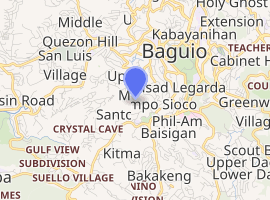Dominican Hill Retreat House
The Dominican Hill Retreat House, also commonly known as the Diplomat Hotel, is an abandoned structure atop Dominican Hill, Baguio, Philippines. It is now undergoing rehabilitation through the efforts of the city government. The whole property on which it stands has been renamed as the Dominican Heritage Hill and Nature Park. A panoramic view of the city unfolds from its vantage point, the stone crucifix on the outdoor patio of the hotel's second floor.
| Dominican Hill Retreat House | |
|---|---|

| |
| Alternative names | Diplomat Hotel |
| General information | |
| Status | Complete |
| Country | Philippines |
| Construction started | 1913 |
| Construction stopped | May 1915 |
| Owner | Diplomat Hotels, Inc.(1973-1987) City Government of Baguio (since 2005) |
| Design and construction | |
| Architect | Roque Ruaño |
History
Dominican vacation house
In 1911, American friars of the Order of Preachers (commonly known as "Dominican Order") along with a few Spanish members made plans for the construction of a vacation house for them and the nuns of their order in Baguio. One of the members of the order, Fr. Roque Ruaño, O.P., the same architect of the main building of the current campus of the University of Santo Tomas, designed the building. A 17-hectare hill property was acquired from Americans who reside in Baguio and construction is said to have started in 1913 and was supervised by Ruano himself. It was then inaugurated in May 1915. To take advantage of tax exemptions, the order set up a seminary named Colegio del Santissimo Rosario on June 1915 but due to the very small enrollment, the school closed two years later and the building was reverted to its original use. The hill where the building stands was christened as "Dominican Hill".
During World War II, the people fleeing from the Japanese sought refuge within its walls. Japanese forces invaded the property and turned it into their headquarters, making it as the last bastion and garrison of the Japanese Imperial Army. Their secret police known as the Kempeitai, committed barbaric acts in the place such as torturing, raping, and decapitating priests, nuns, as well as refugees. During the liberation of the Philippines in April 1945, the American forces bombed the place and partially hit the right wing of the building while Japanese forces committed suicide. Between 1945-1947, the building underwent restoration.
As a hotel
Diplomat Hotels, Inc. acquired ownership of the property in 1973 and remodeled thoroughly the interior into a 33-bedroom hotel but still retaining the unique features which was earlier established by the Dominican friars. The hotel was managed by Antonio Agapito "Tony" Agpaoa, a Baguio-based entrepreneur and faith healer famous for psychic surgery. Agpaoa suffered a heart attack and was diagnosed with brain hemorrhage in the 1980s. He died in 1987 of the ailments. Since his death, the hotel ceased operations and was abandoned. Following its abandonment, the place was looted and sacked. The building also sustained significant damage during the 1990 Luzon earthquake.
Recent use
The Housing and Urban Development Coordinating Council, formerly known as the Ministry of Human Settlements, took over the ownership of the hotel. The Presidential Management Staff (PMS) came next.
The hill is currently named as Dominican Heritage Hill and Nature Park. The PMS stated that the property was conveyed to City Government of Baguio and was declared a National Historical Site through TCT No. T-85948 in 5 April 2005. The Deed of Conveyance and City Resolutions provided for the rehabilitation of the old building and the development of the property into a park by obligating the city. It is now under the maintenance of the City Environment and Parks Management Office (CEPMO).
In May 2012, Baguio inaugurated two new function halls in the hotel as part of the development of Baguio Dominican Heritage Hill and Nature Park as a preserved heritage site and to promote tourism. The halls could be rented for P200 an hour or P2,000 a day for weddings, trainings and workshops among others.
The entire property was declared as a historical site through City Resolution No. 168, series of 2013. The city would next seek its declaration by the National Historical Commission of the Philippines as a National Historical Site.
Today, the place is a favorite spot for photography, airsoft tournaments, film making, wedding receptions and photography, cosplay photoshoots and many more.
In popular culture
The hotel is considered by paranormal believers to be haunted due to its brutal World War II history.[1][2] It was featured on television programs: Magandang Gabi, Bayan's 2004 Halloween Special, AHA! and Kapuso Mo, Jessica Soho.
| Wikimedia Commons has media related to Diplomat Hotel (Baguio, Philippines). |
References
- Palma, Renzelle Ann (23 October 2013). "Top 5 Baguio Haunted Spots". Choose Philippines. Find. Discover. Share. ABS-CBN Corporation. Retrieved 6 June 2018.
- Vince (23 October 2014). "Five Haunted Places In Baguio City". LakbayBaguio. Retrieved 6 June 2018.